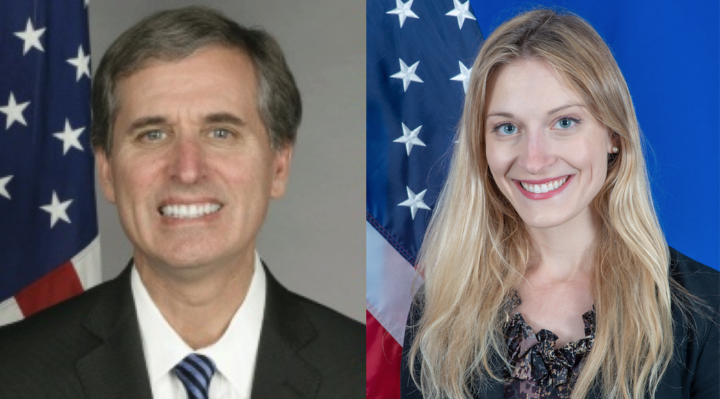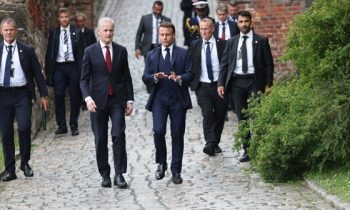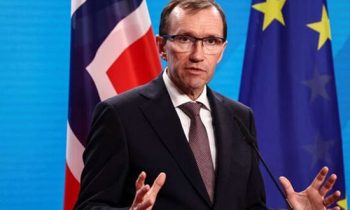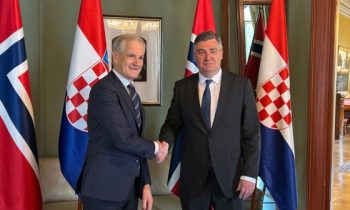The Trump administration says it is exploring ways to extradite a former Venezuelan military spy chief accused of drug smuggling, even after Spain’s National Court rejected a U.S. extradition request.
Deputy Assistant Secretary of State for Cuba and Venezuela Carrie Filipetti said Thursday that the U.S. hopes the court will reconsider the case of retired Maj. Gen. Hugo Carvajal. She says Washington is talking with Spain’s government “to try to identify what the next steps are.”
Early this week, the Spanish court rejected the extradition request, finding it was politically motivated, as Carvajal claimed.

Below is a full rush transcript of the press conference with Senior Bureau Official Scott Busby and Deputy Assistant Secretary Carrie Filipetti and Scott Busby serves as Deputy Assistant Secretary in the Bureau of Democracy, Human Rights and Labor at the U.S. Department of State in Washington, DC.
MR BUSBY: Thank you, Vanessa. Nicolas Maduro and his cronies are committing egregious human rights violations against the Venezuelan people. They are depriving them of their fundamental freedoms through systemic repression, torture, and intimidation. UN High Commissioner for Human Rights Michelle Bachelet underscored this in Geneva last week when she presented her update to the July 5th report on the human rights abuses of the former Maduro regime to the UN Human Rights Council.
One of the most unsettling statistics in that report is that the former Maduro regime’s special action forces killed at least 5,287 people in 2018, and at a minimum another 1,569 people by mid-May 2019. Torture and extrajudicial killings continue, including 57 alleged new cases of presumed deaths since the July report. The high commissioner’s update coming two months after the chilling expose of the former regime’s horrors demonstrates the former regime’s continued disinterest in safeguarding the interests of the Venezuelan people.
The United States condemns these killings, attacks, and the hundreds of arbitrary detentions that have taken place in Venezuela under Maduro’s illegitimate leadership. We stand with the victims’ families in demanding justice and accountability. And we appeal to the countries that have not yet formally recognized Interim President Guaido to do so urgently and to withdraw any lingering support for the former Maduro regime’s de facto hold on power. Neutrality means support for the former Maduro regime. Countries that remain neutral in the face of these egregious violations of human rights are enabling the former regime.
MS FILIPETTI: I’m really excited to be here with my colleague, Scott, for this briefing on the U.S. response to the crisis in Venezuela brought on by the former Maduro regime’s corruption, repression, and incompetence.
It’s an important moment for us to discuss Venezuela. Since Interim President Juan Guaido assumed constitutional leadership in Venezuela, we’ve seen a number of key milestones. Fifty-five countries recognize his leadership and the leadership of the National Assembly. The region has invoked the Rio Treaty for the first time in 18 years, signaling its commitment to pursue concrete actions for a collective response.
The United States and allies, such as Canada and the European Union, have imposed economic sanctions, including over 200 from the United States alone. And many countries have underscored the illegitimacy of the Maduro regime through travel restrictions, indictments for corruption or narco-trafficking, and freezing of assets.
At the same time, the government of Interim President Guaido has done everything it can do to support the people of Venezuela, who are the true victims of the former Maduro regime. They’ve held regular meetings of the National Assembly to discuss topics of key concern for the future of Venezuela. They have provided food and medicine to the people of Venezuela, and they’ve sought to highlight the Maduro-driven crisis that has forced over 15 percent of the population to flee to neighboring states.
And this has all been done in the face of widespread repression, intimidation, and human rights abuses. It is precisely these practices by the former Maduro regime, the murder of those who’ve been arbitrarily detained, the revocation of immunities for democratically elected national assembly members that has led to the suspension of the Oslo Process. Because despite the herculean efforts of the Norwegians and democratic actors inside Venezuela, the former Maduro regime continue to try to manipulate the negotiation process in the same way it did in 2016 and talks in 2017 and 2018 to use a dialogue in which they had no intention to truly participate, to merely create more space and time for themselves. But we will continue to work with our allies and the 55 countries who have recognized Interim President Guaido to support the people of Venezuela through this humanitarian and political crisis. We will continue to support the Lima Group as it leads the regional response and support our allies who have so generously opened their doors to Venezuelan refugees. We stand with the people of Venezuela now through their darkest days, and we’ll be proud to continue to stand with them as they restore their country’s proud legacy of liberation and democracy.
MR BUSBY: Let me start by saying that we’ve done a number of things to respond to the human rights abuses. We are obviously publicizing them as much as we can, but we’ve also sought to sanction – both through economic sanctions and through visa restrictions – many of the individuals who are most culpable for these abuses, and we will continue to do that so long as these abuses continue.
MS FILIPETTI: And I would just add to that, why do we think these abuses are increasing? And in our view it’s because the Maduro regime is desperate. When desperate dictators have their backs against the wall, they use the only tools that they know, which is brutality and repression. And so we actually think that this is one of many signals that we are on a trajectory that is ultimately going to get Maduro out of power.
Question – “PDVSA tried to transfer millions of Euros to a Bulgarian bank. Our U.S. ambassador met our prime minister and attorney general. Does the United States – is the United States taking part in this investigation, and has it led to any results?”
MS FILIPETTI: Great, thank you. So I actually don’t know specifics of that case, but I would just point out that we have designated PDVSA because it’s one of the many examples of how the Maduro regime manipulates and steals natural resources that belong to the Venezuelan people. And PDVSA has been a source of income for the Maduro regime, using it to line the pockets of regime insiders. And so it’s a question both of U.S. sanctions policies, but also of morality. And so we hope that our allies will continue to work with us in ensuring that we are restricting those sources of income for the Maduro regime.
Question – “Do you have an update on the U.S. action expelling two diplomats from Cuba’s UN mission in New York for allegedly trying to conduct influence operations in the United States?”
MS FILIPETTI: Sure, I do have an update. So as we announced yesterday, we identified that there were two Cuban individuals who are accredited to the Cuban UN mission who were conducting what we’ve referred to as influence operations. And while I can’t get into specifics on exactly what that means, what I will say is that we have been saying for years that the Cuban regime violates the sovereignty of every country that it operates in. It violates the sovereignty of Venezuela, it attempted to violate the sovereignty of the United States, and I’m certain that it violates the sovereignty of other countries where they have diplomats. And so I would encourage all our allies to take a close look at what are the Cubans actually doing in their country, what kind of operations might they be conducting there. We’re very proud of the action we’ve taken, and as long as the Cuban regime continues to send people to this country to conduct inappropriate behavior, we will continue to take the required actions.
Question – UN High Commissioner Michelle Bachelet reaffirming her report on human rights abuses, but also noting that the American sanctions are exacerbating the economic situation in Venezuela. Could you talk about this allegation?
MS FILIPETTI: We’ve heard this allegation from a number of people. I mean, the Maduro regime also tries to claim that U.S. sanctions have been the cause of the crisis in Venezuela. It’s simply untrue. If you look at the trajectory of the economic collapse, of the humanitarian collapse, of the human rights abuses, they all started in 2013 when Maduro came into power, and they’ve continued to get worse because of his corruption and mismanagement.
If you look at what our sanctions target, they are targeting individual actors and entities that are specifically stealing resources from the Venezuelan people. This is not money that was ever going to support humanitarian assistance. For example, instead of spending $200 million on humanitarian aid, the Maduro regime negotiated a $209 million contract with the Russian military. That’s what their priority is. Those are the funds that we’re trying to siphon off because those are funds that should be going to the people of Venezuela and supporting them as they try to bring democracy back to their country.
MS FILIPETTI: Yeah. Let’s talk about the – how he was able to get those signatures. What he did – we’ve all seen these videos circulating in social media. He used the CLAP program, which is supposed to be a humanitarian assistance program. First, he starves the people. Then he says: In order to get a piece of bread, you need to sign this signature – you need to sign your signature on this petition saying, “No more Trump.” This is not a symbol of popular support. Again, it’s a symbol of his desperation. He needs to extort people in order to get any kind of support for himself. And again, it demonstrates that he has no interest in the people of Venezuela; he just has an interest in himself.
Question – Can you address Maduro’s use of political violence against Venezuelan citizens?
MR BUSBY: Let me just say that as High Commissioner for Human Rights Michelle Bachelet has amply documented, the violence is widespread. There have been thousands of killings. People – thousands of people arbitrarily detained, many, many people tortured. So there’s no question that Maduro is prepared to use violence to stay in power. So it’s already happening. It continues to happen. And we have every reason to believe that he will continue to use these methods to stay in power.
MS FILIPETTI: And I would just add to that that these abuses aren’t operating in a vacuum. These abuses were happening while there was supposed to be a negotiation process. And this is why we always say the Maduro regime and its abuses of power have led to the suspension of the Oslo process, because while that process has been ongoing, we’ve seen all these figures that Scott has been talking about – almost 7,000 people murdered by the regime in a matter of 18 months; 26 deputies having their immunities revoked despite having it by virtue of their election. We’ve seen Fernando Alban, who was murdered while in regime custody. We’ve seen Roberto Marrero, who has been now six months as of tomorrow in regime custody for committing no crime. Juan Requesens has been in prison for over a year. These are examples of why the Oslo process failed, because how can we possibly expect the Venezuela opposition to be able to negotiate if they’re constantly being intimidated and harassed.
Question – Do you evaluate the application of new economic sanctions against – how do you evaluate the application of new economic sanctions against Maduro’s regime? Are there sectors that have not yet been reached by the sanctions?
MS FILIPETTI: We were told many months ago the Maduro regime had made an announcement that the U.S. could no longer have any more sanctions because we had used all of the tools available. And then on August 5th, we designated the Government of Venezuela demonstrating that, in fact, we do have a number of tools. We have a number of different sanctions available to us. We have a number of other tools as well. And with the Rio Treaty now, we’re seeing the region come together to consider potential sanctions that they can levy against the Maduro regime. So it’s not just us.
In terms of what our purpose is and how we evaluate their impact, it really is about making sure that we can constrain as many resources that are going to the Maduro regime while simultaneously mitigating any effects that it could have on the population as a whole. We’ve been committed to addressing the humanitarian crisis in Venezuela and have delivered more than $370 million worth of humanitarian assistance, which is the single-largest amount of any international donor to the crisis.
So those are the two principles that we look at when we evaluate whether or not sanctions are applicable in this case.
Question – Something that there’s been some speculation about, but is there a possibility that the United States would offer amnesty to Maduro?
MS FILIPETTI: So Special Representative Abrams had a conversation about this. Our goal is not to penalize Maduro; our goal is to bring free and fair democracy back to Venezuela. And so we are willing to consider a number of different options that would enable that to be the case.
Question – What is the overall human rights policy of the United States towards Venezuela?
MR BUSBY: Well as we’ve mentioned before, we are first trying to make sure that the facts about the human rights abuses taking place in Venezuela get out. We are ourselves putting these facts out there. We’re talking about them. We’re urging the international community to talk about them. And then as we’ve already discussed, a lot of our policy is focused on sanctioning those individuals who are culpable for committing these abuses. And our view is that these sanctions deter not only these people from engaging in these abuses, but also deter other people from engaging in these sorts of abuses.



